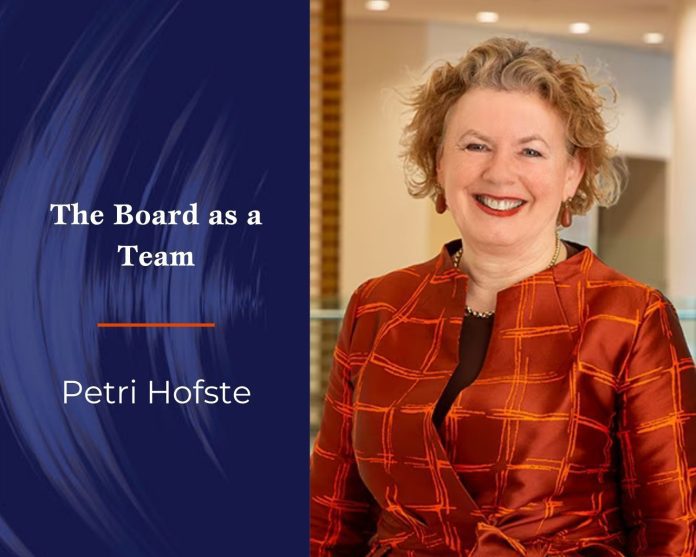The podcast and the article are brought to you by The Better Boards Podcast Series.
The Board as a Team may be a surprising topic. Are Boards of Directors individuals in a group or a Team? If the Board is a team, who is on the team – the Execs, the Non-Executives, or both? The academic literature and practitioners are ambiguous about whether a Board is a team or not.
In this podcast, Dr Sabine Dembkowski, Founder and Managing Partner of Better Boards, discusses the concept of the Board as a team with Petri Hofste. Petri was for several years the No. 1 NED in the Netherlands (according to the independent analysis annually conducted by Management Scope). After a successful career as an auditor and a CFO, she embarked on a portfolio career. She serves on leading organisations in the Netherlands. For her, it is vital that the Board is a team.
“A diverse Board means that in order to make it work, you have to work harder”
Petri opens by explaining that the difference between a Board of individuals and a team is the connection with other people, which brings fun into work. The Covid crisis highlighted that you lose that connection if you lose that feeling of being part of a team by only seeing each other through online means, electronic devices or even the telephone. After Covid, every Board needed a reset, getting to know each other again. Petri believes a Board needs to work as a team because only then do you get the creativity needed to make the best decisions. It is too late to become a team when it is most needed in a crisis. Today’s issues and transformations form a truly complex environment, and more and more Boards need diverse insights and perspectives. Petri believes that this requires hard work because it is more difficult to understand people who are different from you. Getting members to appreciate each other is critical which requires time.
“The starting point is truly being interested in each other, as well as in the task at hand”
Petri stresses that the team concept applies to Boards, and members need to be interested in each other and the organisation and understand each other’s views. Then, a Board can come to a shared view that includes shared norms and values. In a complex environment, taking sustainability as an example, she notes that everything is new and undiscovered territory, so nothing can even be truly measured for decision making and economic goals yet. Dilemmas arise very quickly, because of all the different stakeholders, and these fundamentally affect the business model and strategies of companies. So, it is important to share views around values and laws related to the decision-making in these complex areas.
“Ensure that you focus on the right issues, and also ensure that you do not focus and do not discuss what doesn’t need to be discussed”
Petri notes that time commitments only continue to increase and increase. She has seen, for instance, how well a pre and post meeting with the Non-Executive Directors can work. A pre-meeting creates an opportunity to see what shared concerns should be focused on in the meeting, and can avoid extra discussion on things that are not the main focus at the Board but will eat into the time available. So, prioritising and ensuring the right topics are on the agenda helps. A post-meeting allows Board evaluation of whether the intentions were achieved and how adjustments might be made if it is felt there are things that need to be improved. Petri also recommends meeting informally once every quarter or so.
“It generally works best if company secretaries really ensure to team up with the chairs”
Petri notes there are different types of Company Secretaries and believes the best way of working is for them to team up with the Board or Committee Chair. This leads to understanding what the chair wants to achieve and how they want to structure the agenda, and in this, company secretaries can be a great help. She acknowledges that sometimes there is hesitance reaching out, but as a chair, you can overcome that and make it work. The corporate governance codes that are everywhere now require at least an annual evaluation, and these should allow you to sit down and bring issues to the table and overcome any hesitance. She also points out the benefit of general requirements to do evaluations at least once every three years with an external evaluator. As a result, if there is a hesitancy to speak up within the team, an external person can help bridge that. She believes that in evaluations it is always critical that the Company Secretary is involved in one way or another.
“If you do not like being on a Board. If you do not feel connected to the other people on the Boards, how can you bring the best in yourself to that Board?”
Perti advocates the team approach because people feel more able after the meeting to make an approach to discuss one-on-one. A Board that has invested in the whole team and each other makes it far easier to have one-on-one discussions. She also feels that people need to enjoy being on the Board and feeling connected to the other members so that the best of everybody is brought to the Board. That means appreciating and respecting what every person brings to the Board and ensuring everybody can be open. She reiterates that this is critical in a crisis. In the current complex environment with huge dilemmas with sustainability, geopolitical issues, etc, there are issues that require Board members to bring their best, be open, and ensure that everything comes to the table before making a decision. Working as a team in this way is an investment that pays off on a personal level, and pays off for the team in decision making, so ultimately pays off for the organisation.
The three top takeaways from our conversation are:
- A Board needs to invest in being a team.
- Understanding where people come from and bringing forward the strengths of every individual as well as the strengths of the team is worthwhile. This investment needs to be on the personal and organisational levels.
- Board members owe the companies they serve and society to bring the best out of each individual on a Board.
Don’t forget to subscribe never to miss an episode of the Better Boards Podcast Series. Available on their website, Apple, Spotify or Google.
To find out how you can participate in the Better Boards Podcast Series or more information on Better Boards’ solutions, please email us at info@better-boards.com.





































